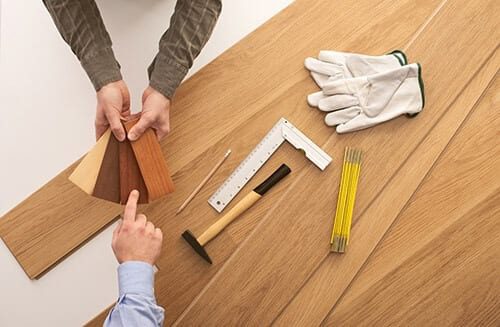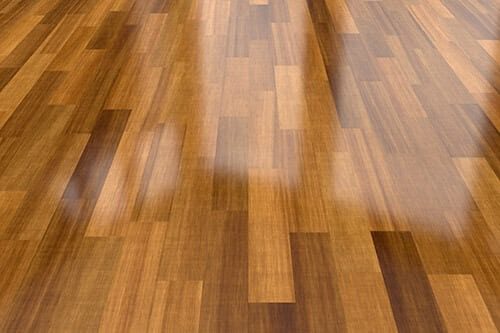Hardwood Floors Dallas
Hardwood Floors Dallas

Engineered Hardwood Flooring
Engineered hardwood is taking the flooring world by storm. Sure, real hardwood remains quite popular, but the appeal and versatility of engineered hardwood has homeowners interested. Read on to learn more about engineered hardwood flooring to see if it suits your lifestyle and preferences.
What is engineered hardwood flooring?
The special feature of engineered hardwood flooring is its layered composition. It consists of multiple layers, with the uppermost layer being a polyurethane cover designed to safeguard the underlying second layer, composed of hardwood veneer. Customers select any type of wood for the hardwood veneer. There are no limitations; you can purchase engineered hardwood with a cherry, walnut, maple, oak, hickory, etc. veneer…whichever type you want.
Below the hardwood veneer is the wear layer. The wear layer is usually quite thick (for flooring purposes), allowing it to protect the upper layers against scratching and moisture absorption.
Under the wear layer are multiple cross layers of plywood. These layers, generally ranging from 3 to 12 layers, provide extensive support to the entire plank. Due to these protective layers, it’d take a major impact or a major water spill to reach the core of an engineered hardwood plank and damage it.
What makes engineered hardwood flooring so special?
The multi-layer composition of engineered hardwood flooring is what gives engineered hardwood an edge over the other types. You won’t find a lot of floors that are resistant to water. Hardwood is not genuine, and neither is stone tile. Both of those types have to be sealed in order to protect against water damage; sealing is of course an added cost to your flooring purchase. As for carpeting, you’re pretty much done for if you experience water damage.
Really, the only two types of flooring that can withstand moisture better than engineered hardwood are porcelain and ceramic tile.Porcelain exhibits a water absorption rate of under 0.5%, while ceramic has a slightly higher water absorption rate. Of course, both porcelain and ceramic tiles lack the charming allure of an engineered hardwood floor.
Tile isn’t comfortable as bedroom flooring, though.
Where will it fit in your home?
When it comes to placing flooring, which rooms are best suited for engineered hardwood floors Dallas? Engineered hardwood flooring works well in virtually any room.
Because engineered hardwood floors Dallas can guard against moisture, they can be installed in kitchens and laundry rooms.
Due to its elegant, comforting appeal, you can have engineered hardwood flooring installed anywhere in your home. Your living room is the perfect place! Imagine an oak engineered floor in your living room with a lit fireplace in the background with your family relaxing…it’s the ideal living space.
The kitchen might be an even better place to have engineered hardwood flooring installed. A kitchen is used often, so your guests and family can appreciate its looks day or night. It will enjoy the advantages of natural light all day long. Plus, engineered hardwood flooring will fit with any kitchen design. It can help update an older kitchen and add more charm to a modern one.
Compared to hardwood…
You’ve probably picked up on the differences by now, but here are some of the notable differences between real and engineered hardwood flooring:
- An engineered hardwood plank is composed of multiple protective layers, while a hardwood plank is made of one solid chunk of hardwood.
- Due to its composition, engineered hardwood can withstand practically any moisture spill, while hardwood flooring can be damaged by even moderate moisture exposure.
- Engineered hardwood gives off the same look as real hardwood. With engineered hardwood, a homeowner will be getting the same great look, but with more durability.
- Engineered hardwood floors Dallas are relatively similar to real hardwood flooring in price, though real hardwood is slightly more expensive. Engineered hardwood can vary in price, costing as little as $4 per square foot and as much as $13 per square foot. The price of real hardwood hardly varies. It’s usually around $11-$15 per square foot (purchase and installation).
Consider sanding and refinishing
One important consideration, however, is the number of times a type of flooring can be refinished. One of the great features of real hardwood is that it can be refinished countless time. This becomes achievable due to the fact that the flooring is entirely composed of hardwood.
As your flooring ages, it will experience wear and tear. There’s no way to avoid it. Therefore, homeowners can refinish a hardwood floor, basically giving it a makeover. A refinished floor will be free of scratches and flaws.
Engineered hardwood flooring in Dallas can’t be refinished countless times. Most, in fact, can only be refinished once or twice. When buying an engineered wood flooring, aim to choose one that features the most substantial wear layer. For instance, a 3 mm thick wear layer will probably be able to be sanded and refinished twice. Unfortunately, the maximum thickness you’ll come across for a wear layer is approximately 3 mm.
It’s sort of a trade-off with engineered hardwood flooring. On one hand, it’s really difficult to damage. On the other hand, the refinishing opportunities are limited if it does happen to get damaged.
Compared to laminate…
Homeowners often turn to laminate flooring if they can’t afford actual hardwood flooring. Laminate is a valid choice, but you’d basically be paying for a less appealing version of engineered hardwood flooring.
Laminate is also created from multiple layers. It’ll usually have a wear layer on the top, then a design layer, followed by a series of substrate layers. Laminate withstands moisture and prevents scratching, just like engineered hardwood.
The difference is the design layer. Engineered hardwood flooring incorporates a genuine hardwood layer, whereas laminate flooring features a high-resolution image depicting real hardwood. The picture is undeniably striking, but it clearly falls short when compared to the actual experience.
The point is, the beauty of your flooring will suffer if you choose laminate hardwood. Your look will not suffer at all if you choose engineered hardwood flooring. Similar benefits from a durability standpoint, but engineered goes above and beyond when it comes to appearance.

Maintaining engineered hardwood floors
You won’t have to go above and beyond to maintain your hardwood flooring. We’re talking basic sweeping and vacuuming once a week. Obviously, your cleaning habits will vary if your kids or pets are constantly dragging dirt in from playing outside.
-When vacuuming, make sure to use the proper setting for hardwood floors Dallas. Many contemporary vacuum cleaners come equipped with dual settings, catering to both soft and hard surfaces. Using the proper setting will avoid scratching to the wear layer.
-Mopping is another option. It could be problematic for hardwood flooring, it’s not a problem for engineered hardwood flooring. Don’t pour water directly onto the floor, but dipping the mop into a bucket of water and mopping will do well to clean up.
-It’s still a good idea to clean up any spills as soon as they occur. Engineered hardwood is moisture-resistant, not waterproof. Continuous exposure to moisture can be a risk for the type of flooring over an extended period. Hopefully you’re already used to cleaning up spills immediately, but if you aren’t, make sure to get into the habit of doing so.
Engineered hardwood floors Dallas only require basic cleaning. General dust and debris are unavoidable, but you can clean it up quite easily. Be mindful of moisture and scratching, but you won’t have to carry out any major cleaning tasks to avoid issues with your engineered hardwood floor.
How long will an engineered hardwood floor last?
You can expect it to last for about 20 years. But your floor’s lifetime is entirely up to you. If you maintain your engineered hardwood flooring by taking care of its wear layer, then the floor can last even longer. Keeping the wear layer in perfect condition and elongating its durability will in turn keep your entire floor durable and long-lasting.
Regular maintenance is crucial, but the durability of engineered hardwood floors Dallas ultimately depends on the initial purchase. Again, the durability of your flooring and the number of times it can be refinished depend on the thickness of the wear layer. A longer lifespan for engineered hardwood flooring is achieved through a thicker wear layer and the ability to refinish the floor multiple times.
You will have to pay more for a thicker wear layer, but it’ll be well-worth it long term. Budget restrictions are completely understandable, but if you save up for it, you won’t regret it!
Can the installation of engineered hardwood flooring enhance the value of your residence?
Absolutely!
Any floor that lasts for a minimum of 20 years and a maximum of 100 years is bound to increase your home’s value. Engineered hardwood provides the durability that prospective homeowners seek. It also offers the appearance and versatility people want.
Purchasing and installing engineered hardwood flooring increase both current and future value. The present is probably more important, but future added value is a bonus!
For all your flooring needs, call Toscana Remodeling! Please visit our website—toscanaremodeling.com—to see the products and services we offer. Contact us, drop by our location, or submit an online application for a flooring quote. Whatever your home improvement project is, let Toscana Remodeling help!
Conclusion
In conclusion, Hardwood Floors Dallas is more than just a trend; it’s a practical and aesthetic choice for homeowners in Dallas. Balancing durability, moisture resistance, and timeless beauty, it offers a flooring solution that stands the test of time.
FAQs
1. Is engineered hardwood suitable for all rooms in Hardwood Floors Dallas?
Yes, engineered hardwood’s moisture resistance makes it suitable for virtually any room, including kitchens and living rooms.
2. How often should I refinish my engineered hardwood floor in Hardwood Floors Dallas?
Depending on the wear layer thickness, you can typically refinish engineered hardwood floors once or twice. Choose a thicker wear layer for more refinishing opportunities.
3. Can I install engineered hardwood myself in Hardwood Floors Dallas, or should I hire a professional?
While DIY installation is possible, hiring a professional ensures proper installation, maximizing the floor’s longevity.
4. Does engineered hardwood cost more than laminate in Hardwood Floors Dallas?
While both have a similar price range, the aesthetic appeal and durability of engineered hardwood justify the slightly higher cost.
5. What makes Toscana Remodeling a reliable choice for flooring needs in Hardwood Floors Dallas?
Toscana Remodeling offers a range of quality flooring products and services, backed by expertise and a commitment to customer satisfaction.
Associations






